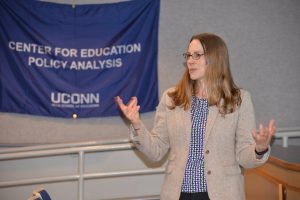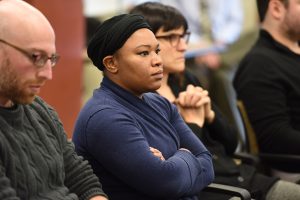On April 20, the Center for Educational Policy Analysis hosted Dr. Ebony Bridwell-Mitchell of Harvard Graduate School of Education for it’s ninth and final CEPA Speaker Series event for the 2016-2017 school year. Dr. Bridwell-Mitchell’s presentation titled, “Them That’s Got: How Tie Formation in Partnership Networks Gives High Schools Differential Access to Social Capital” examined partnership formation among 211 New York City public high schools and 1,098 partner organizations from 1999 to 2005 and marked a strong end to the speaker series.
The Speaker Series is an effort to expose UConn students and faculty to diversified research content, and engage them in conversations about it. It drew distinguished policy researchers from around the country to present to audiences that included students, faculty from Neag and other UCONN schools and departments, administrators, and K-12 educators. CEPA collaborated with different partners to make these events possible, including the Department of Economics and El Instituto.
Bridwell-Mitchell’s presentation discussed how school partnerships are important sources of social capital as well as how some schools see unequal access to this social capital as a result of multiple patterns in the school-partner network that deter partnership formation for disadvantaged schools. It was an extremely engaging presentation as she encouraged questions, and then lead discussion on how this research could be expanded in the future, thus fostering critical thought.
This type of immerse thought-provoking conversation was not unique to this event, but instead characteristic of all nine CEPA Speaker Series events as they exposed students and faculty to research and ideas from a diverse group of notable academics within and outside the University of Connecticut.
The series kicked off with a presentation on September 27, 2016 from Peter Youngs of the Curry School of Education at University of Virginia’s presentation titled, “The Role of Social Context In Novice Teacher Development.” Next, Dr. Amy Ellen Schwartz, a specialist in public and urban economics as well as economics of education, and Daniel Patrick Moynihan Chair in Public Affairs at the Maxwell School of Syracuse University, presented on the influences that universal free meals have on student outcomes as it reduced the stigmas associated with free meals and encouraged participation.
Before the winter break, CEPA hosted John Papay of Brown University and Sean Corcoran of the Steinhardt School of New York University. Papay discussed the context of Massachusetts as one of the highest performing school systems and the effectiveness of turnaround strategies for their lower performing schools, and Corcoran presented “Leveling the Playing Field for High School Choice Through Decision Supports: A Randomized Intervention Study.”
Returning from break with two February events, the Center for Educational Policy Analysis continued on strong with the Speaker Series as Dania Francis of the University of Massachusetts at Amherst tackled issues of gender and race bias in school counselor recommendations for advanced coursework, and UConn’s own Jorge M. Agüero looked beyond the national scope and presented research on the expansion of the school day in Peru, as it relates to school quality and behavioral responses.
 Other events in the spring included an evaluation of READY4K!, a text messaging intervention program for parents of preschoolers that aimed to engage parenting and increased parental involvement and therefore early literacy skills, from Susanna Loeb, Barnett Family Professor of Education at Stanford, and a student-faculty discussion on the influences of race and gender on teaching and learning in tertiary education lead by Dr. Ana M. Martínez Alemán, associate dean for faculty and professor of the Educational Leadership and Higher Education Department at Boston College’s Lynch School of Education.
Other events in the spring included an evaluation of READY4K!, a text messaging intervention program for parents of preschoolers that aimed to engage parenting and increased parental involvement and therefore early literacy skills, from Susanna Loeb, Barnett Family Professor of Education at Stanford, and a student-faculty discussion on the influences of race and gender on teaching and learning in tertiary education lead by Dr. Ana M. Martínez Alemán, associate dean for faculty and professor of the Educational Leadership and Higher Education Department at Boston College’s Lynch School of Education.
These highly engaging events, as well as the diversified content as CEPA hosted speakers specializing in all levels of education from pre-K to higher education created an opportunity for students and faculty to involve themselves in research and ideas from sources they probably would not have connected with otherwise. Morgaen Donaldson, Director for the Center for Educational Policy Analysis, commented that,
“The speaker series is meant to bring together faculty, students, and others who are interested about education policy research. Our hope is that these sessions stimulate conversations and ultimately lay the foundation for future collaborations within and outside Neag.”
The 2016-2017 CEPA Speaker Series has surely accomplished this goal, and the Department of Educational Leadership extends a thank you and a job well done to the Center for Educational Policy Analysis, all those who helped fund and run the events, and the excellent speakers for sharing their research. CEPA’s Shaun Dougherty and Morgaen Donaldson, led the effort to create this series, but it’s success is a product of the CEPA affiliates as a group.
Although CEPA has wrapped up the events for this year, the Center for Educational Policy Analysis will be continuing the Speaker Series into the 2017-2018 school year as it really connected students and faculty across the Neag School of Education, and the University more broadly.
For a full recap, please visit the Neag School's website for further information.
 Facebook
Facebook
 Twitter
Twitter
 LinkedIn
LinkedIn